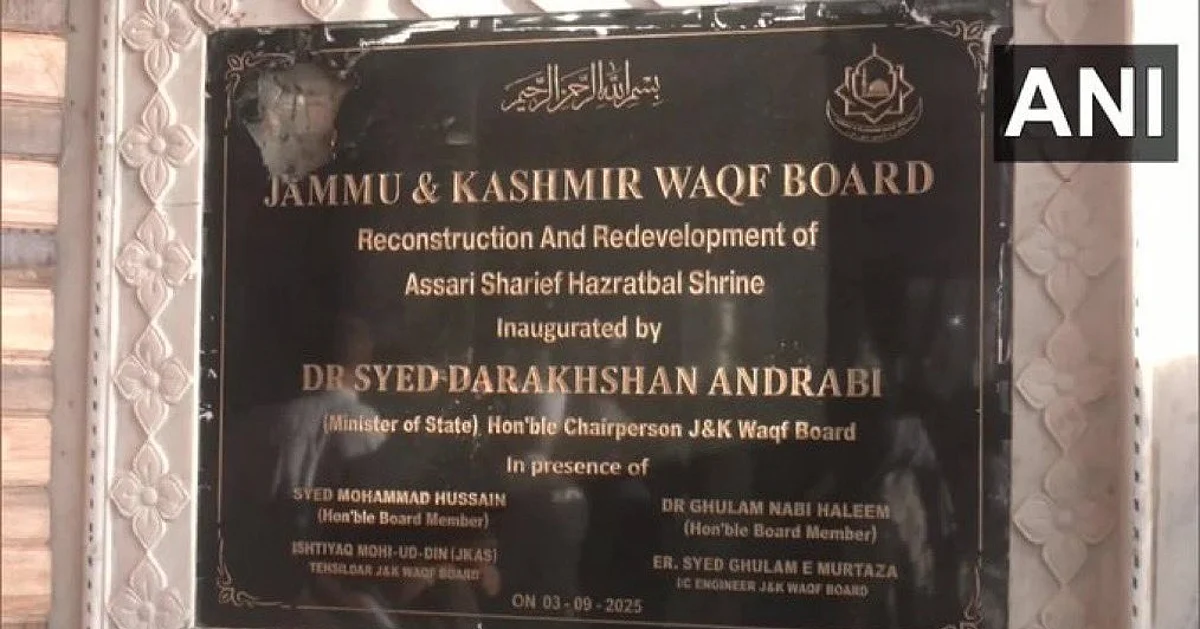Top Stories
Protests Erupt at Hazratbal Shrine Over Defaced Ashoka Emblem

A controversy erupted on Friday at the revered Hazratbal Shrine in Srinagar after the Jammu and Kashmir Waqf Board inscribed the Ashoka Emblem on the foundation stone of a new structure within the shrine. This decision prompted protests from devotees, who accused Waqf Board chairperson and senior BJP leader Darakhshan Andrabi of showing insensitivity towards the religious sentiments of Muslims.
Protesters expressed that the inscription represented a violation of Islamic traditions. Many called for immediate accountability from the authorities, viewing the move as a significant affront to their faith. In a heated atmosphere, the emblem carved on the foundation board was subsequently defaced by some individuals participating in the demonstration.
Waqf Board Chairperson Condemns Defacement
In response to the defacement, Andrabi condemned the action, labeling it a “terrorist attack.” She urged Prime Minister Narendra Modi, Home Minister Amit Shah, and law enforcement agencies to take swift action against those responsible. “Those who carried out this act are nothing less than terrorists,” she stated during a press briefing.
Andrabi further alleged that the unrest was not a spontaneous reaction but rather a planned event orchestrated by political factions. “I had already warned that such trouble could be created. FIRs will be filed against everyone responsible, including the MLA whose tweet added fuel to the fire,” she asserted.
Reactions from Local Politicians
Earlier, National Conference MLA Tanvir Sadiq, a close associate of Chief Minister Omar Abdullah, openly criticized the decision to inscribe the Ashoka Emblem. In a post on social media platform X, he stated that, while he is not a religious scholar, Islam strictly forbids idol worship, which he described as a grave sin.
He emphasized that the foundation of the Islamic faith is Tawheed, the oneness of God, and argued that the presence of the Ashoka Emblem—a sculpted figure—contradicts this fundamental belief. “Sacred spaces must reflect only the purity of Tawheed, nothing else,” he concluded.
The incident has sparked a broader discussion about the intersection of religion and politics in the region, particularly concerning the responsibilities of the Waqf Board in managing religious sites. As the situation develops, the community remains on edge, awaiting further actions from both local authorities and political leaders.
-

 World5 months ago
World5 months agoSBI Announces QIP Floor Price at ₹811.05 Per Share
-

 Lifestyle5 months ago
Lifestyle5 months agoCept Unveils ₹3.1 Crore Urban Mobility Plan for Sustainable Growth
-

 Science4 months ago
Science4 months agoNew Blood Group Discovered in South Indian Woman at Rotary Centre
-

 World5 months ago
World5 months agoTorrential Rains Cause Flash Flooding in New York and New Jersey
-

 Top Stories5 months ago
Top Stories5 months agoKonkani Cultural Organisation to Host Pearl Jubilee in Abu Dhabi
-

 Sports4 months ago
Sports4 months agoBroad Advocates for Bowling Change Ahead of Final Test Against India
-

 Science5 months ago
Science5 months agoNothing Headphone 1 Review: A Bold Contender in Audio Design
-

 Top Stories5 months ago
Top Stories5 months agoAir India Crash Investigation Highlights Boeing Fuel Switch Concerns
-

 Business5 months ago
Business5 months agoIndian Stock Market Rebounds: Sensex and Nifty Rise After Four-Day Decline
-

 Sports4 months ago
Sports4 months agoCristian Totti Retires at 19: Pressure of Fame Takes Toll
-

 Politics5 months ago
Politics5 months agoAbandoned Doberman Finds New Home After Journey to Prague
-

 Top Stories5 months ago
Top Stories5 months agoPatna Bank Manager Abhishek Varun Found Dead in Well









